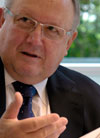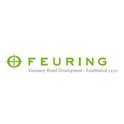Interview with Berno-H. Feuring, founder of Feuring Hotel Consulting GmbH

In 1959, Berno H. Feuring was 21 years old and the youngest hotel director in Germany. He founded his own company in the same year and for 50 years now has - on behalf of hotel chains and investors - developed hotels mainly in the luxury segment and from the first idea to their opening. Amongst them are impressive names like Le Royal Méridien Hamburg, the Steigenberger Hotel de Saxe Dresden, Le Royal Mansour Casablanca or the Bristol in Warsaw, which was re-structured by Feuring. To this day, Feuring as a company has been involved in more than 400 hotel projects all over the world. In the following interview, the senior managing director talks about the special challenges in the hotel sector, his financial strategy as well as passing on the company to the next generation.
Mr. Feuring, how did you succeed in switching from being an individual competitor or “lone fighter” to being a global player? What were the decisive factors for your success?
Feuring As a child, I used to look over my father’s shoulder and watched him organise the catering in the Palace of the Counts Elector and the Guesthouse of the Rhineland-Palatinate Government besides running two other gastronomic establishments in Mainz. This had a decisive influence on me and as a result I was able to open the Europahotel in Mainz when I was only twenty-one. Nowadays, many people describe this hotel as the forerunner for the design hotels we know today. In the first instance, it gave me the opportunity to live out my passion for architecture and design. As a result of the success we had with this new hotel concept, we could open our second hotel only two years later. 14 Hotels were to follow and they were created at a speed which – although not unusual now – was unheard of at the time. Even then, I enjoyed creating new things and developing new locations. This lead to the fact that in the sixties I was already being called on as an advisor for other, especially international, hotel projects and that finally, in the late seventies, I decided to focus on hotel development in order to share my visions with other people.
What exactly do you mean with visions?
Feuring: I mean, analysing future trends and making brave project decisions based on many decades of acquired know-how. Let me explain our definition of “vision” using the example of Le Méridien Munich: The experience of former years showed that travel by train was clearly on the increase and that many railway stations were gradually being modernised. Initially, Feuring forecasted that in the long run the areas around stations would be upgraded both from a social and an economic point of view and that was the basis for our vision: In our opinion, the areas around main railway stations would offer good prospects for the successful positioning of luxury hotels on a long-term basis. In Munich and elsewhere, this vision has meanwhile become reality: The hotel Le Méridien in Munich achieves high rates of occupancy and top earnings. The decision to build a hotel there has upgraded this location considerably and has turned it from an area with the typical atmosphere you would expect to find around a station to a suitable location for first-class hotels, as is shown by the fact that two other excellent hotels have meanwhile been built in the direct neighbourhood. Here, the location was changed and its value upgraded – that exactly was the vision we had.
What are the special challenges for the hotel sector at the moment?
Feuring: Hotels have changed and continue to develop constantly as society changes. Today, consumer needs differ and vary as they have never done before. Ten years ago, spas and wellness areas were not a necessity – nowadays this is no longer the case, at least not in the up-market segment. The biggest challenge today is to develop the right hotel concept for each single location and to select the right operator. That is what I and my company have strived to do right from the beginning.
What kind of financial instruments do you use in order to ensure the expansion of your own company on the one hand and the realisation of multi-million hotel projects on the other? What role does private equity play in this?
Feuring: We finance our company with the consulting or project development work we either do ourselves or on behalf of international investors. These will often be real estate investment funds, real estate developers or companies and private equity companies. Sometimes they will be private investors and of course the classical financial institutes.
To what extent does the financial and economic crisis have an effect on your business?
Feuring: Risk capital has been withdrawn from the market and this has in some cases been done at a breathtaking pace. Capital for financing purposes has become scarce and many companies are reducing their travel budgets in view of the bleak economic prospects. Fortunately, our experience during these difficult times is that people are still very interested in hotels. Although we also anticipate sinking occupancy rates and returns, I know from my 50 years of on-the-job experience that the time is very favourable for making investment decisions. My forecast is that those projects now being developed will be ready just in time for the next to be expected upswing and that in many locations they will establish themselves successfully. That is the reason why we recommend counter-cyclical investments.
Does that mean people should invest in hotels during times of crisis?
The fact that conditions for obtaining loans have been tightened is partly being compensated by clearly lower interest rates. Prices for hotels and in particular for land are getting under pressure and some projects, which were initiated during the period of high prices and have not yet been financed, are being “put on ice” for the time being. This will reduce the number of potential future competitors. We are in a good position as most of our current projects have already been financed and our new projects are absolute prestige projects in top locations and with first class hotel operators. It is still possible to find the funds for projects like this.
What about the subject of succession and which role does your family play in this?
Feuring: I have gradually ushered in the next generation. In his capacity as managing director, my son, Bardo-Maria, is responsible for acquisition as well as architecture and design. My son-in-law, Matthias Lowin, is managing director of Feuring Hotelconsulting and is responsible for project development and the commercial aspects of our business. My other son, Berno-Maria Feuring, is very successful with his own hotel development and FF&E company and is often involved in the realisation of our hotel development projects.
What is the most important advice you can give other entrepreneurs?
Feuring: The times for hotel developments are better than the general climate would suggest. Now is the time to select and decide carefully and to make good use of this period of wide-spread resignation in the interest of the hotel industry.
Mr. Feuring, thank you very much for this interview!
Susanne Hoffmann
ReComPR for Feuring
+49-6131-21632-21
Feuring – Visionary Hotel Development
